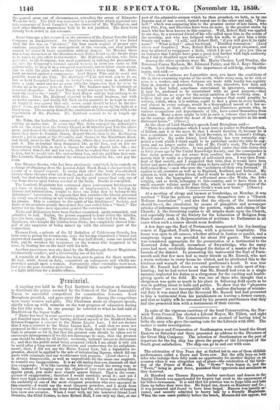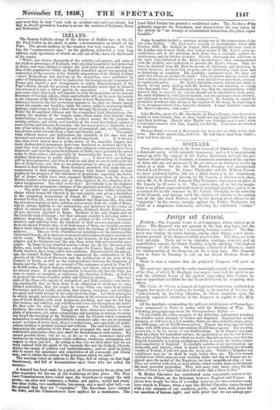puniutial.
A meeting was held in the Peel Institute at Accrington on Saturday to distribute the prizes awarded by the Council of the East Lancashire Union to successful competitors for examination honours. Lord Brougham presided, and gave away the prizes. Among the competitors were many women and girls. The Chairman made an eloquent speech, chiefly taken up with remarks on the vast progress of education during the last fifty years. In one passage he referred to what he had said at Bradford on the liquor traffic. " There has been in some quarters a great complaint, which, however, is not founded upon fact, of my having declared myself at the Bradford Social Science Congress a convert to the Maine Liquor Law. I did not declare that I was a convert to the Maine Liquor Law. I said that we were not prepared in this country for anything of the kind, that it would take a long time to prepare us for it, but that the greatest care should be taken not to encourage intemperance if we did not discourage it—nay, that the greatest care should be taken by all lawful, moderate, rational means to discourage it ; and that the public mind being prepared (which I am afraid it will not be until after a long course of discussion and controversy for its enlighten- ment), then, I did not say the Maine Liquor Law, but a legislative re- pression, should be applied to the sale of intoxicating liquors, which fill our gaols with criminals and our workhouses with paupers. (Loud cheers.) It is always disagreeable, as well as unprofitable for the cause one supports, to commit any exaggerations. It is an old saying that you diminish all that you exaggerate. It is like turning the telescope round the wrong way, so that, instead of bringing near the objects of your view and making them appear great, you make near objects appear distant. That is the conse- quence of exaggeration ; therefore I would carefully avoid it ; and yet I have very high authority on the subject to which I have been referring— the authority of one of the most eloquent preachers who ever appeared in this country—I would say the most eloquent preacher, and I speak from having read his sermons and from having had the advantage also of hearing him upon one occasion. When I went with my late lamented friend Lord Denman, the Chief Justice, to hear Robert Hall, I can only say that, at one part of the admirable sermon which he then preached, we both, as by one Impulse and of one accord, turned round one to the other and said, Plun- kett !' which was comparing him to the greatest orator of late times, who since Pitt, Fox, and Sheridan have been no more, is the greatest orator by much who has been known in this country. Well, Robert Hall was app
1M to one day, by a reverend friend of his who called upon him in the course of
the morning, and who was fatigued with his walk, to give him a little brandy and water. 'I will,' said Robert Hall, ' if you will give it its right name." What is that ? ' asked his friend. Distilled damnation.' (Loud cheers and laughter.) Now, Robert Hall is a man of great eloquence, and may be allowed to exaggerate a little, which I do not. I give you this as an instance that I might have gone a great deal further with high authority than I did at Bradford upon this subject." (Cheers.)
Among the other speakers were Mr. Harry Chester, Lord Stanley, •the Reverend Canon Richson, Mr. Edmund Potter, and Sir J. Kaye Shuttle- worth. Lord Stanley spoke of the importance of self-help, among other topics, and said :- " You whom I address are Lancashire men, you know the conditions of
life in these swarming regions of the north, where every man, be he rich er poor, is a worker, and where fortunes are made with hardly less rapidity than in America or Australia. You will own, therefore, how false and foolish is that belief, sometimes entertained in ignorance, sometimes, it may be, professed to be entertained with no good purpose,—that England affords no scope for the social ambition of the working man. I believe that one of the most interesting volumes that could possibly be written, which, when it is written, ought to find a place in every hamlet, and almost in every cottage, would be a biogra.phical record of a few se- lect instances, at least, of those eminent and illustrious persons who, in various occupations and departments of life, have raised themselves from the ranks. Many a story might be told in such a volume that would buoy up the courage and cheer the heart of the struggling operative in his most distressed hours." (Cheers.)
At the close of Lord Stanley's speech Lord Brougham said- " There is a circumstance which I must state in justice to Professor Craik,
of Belfast, and it is the more fit that I should mention it, because he is now a candidate to succeed Sir David Brewster, at St. Leonard's College, St. Andrew's. My noble friend, Lord Stanley, has very naturally sug- gested a work which I think ought to be published under the title he sug- gests, and no longer under the title of Mr. Craik's work, The Pursuit of Knowledge under Difficulties. It was published under that title thirty-five or forty years ago by the Useful Knowledge Society, and the consequence is that many persons are not aware from reading the advertisement of it merely that it really is a biography of self-raised men. I was then Presi- dent of that society, and I suoegested that title, that it would have been better and more descriptive of the thing to have called it The Biography of Self-raised Men,'—men who were the architects of their own fortunes.' It applies to all countries as well as to England, Scotland, and Ireland. My opinion is, with my noble friend, that it would be much better to cull out of that work the biographies of self-raised men—the Watts, the Ark- wrights, and so forth, belonging to this country, and to have them in a small separate volume under that title, which is more descriptive of the thing than the title which Professor Craik's work now bears." (Cheers.) At a meeting of clergy and laymen at Cambridge, on Monday, it was resolved " That the persons present form themselves into a Church Defence Association' " ; and also that the objects of the Association should be-1, the circulation by means of pamphlets and newspaper articles of information respecting the position, rights, and claims of the Church; 2, the furnishing replies to all attacks made upon the Church, and especially those of the Society for the Liberation of Religion from State Control ; and, 3, the resentation of petitions to Parliament iii all cases when such a course should seem desirable.
A few days ago the Earl of Portsmouth inaugurated his fox-hunting season at Eggesford, North Devon, with a generous hospitality. The house was open to all comers, whether attired in fustian or scarlet, and a sumptuous repast was provided for about 300 guests. The occasion was considered appropriate for the presentation of a testimonial to the Reverend John Russell, incumbent of Swymbridge, who for many years had most creditably discharged the duties of a master of the fox- hounds of the district. In presenting the testimonial the Earl of Ports- mouth said that few men had so many friends as Mr. Russell, who met a warm welcome in every house he visited, and he attributed this to the kindness and warmth of the reverend gentleman's heart. It was true that Mr. Russell had shown an attachment to the noble sport of fox- hunting ; but he had never heard that Mr. Russell had even in a single instance neglected his duties as a clergyman for the exciting and health- giving sports of the field. He was one of those who thought that a clergyman was quite as much in his place in following field sports as he was in gadding about to balls and parties. To show that the pleasures of the chase" are not incompatible with a zealous discharge of ministe- rial duty it was stated that the Reverend Mr. Russell had had presented to him a testimonial from his parishioners on leaving a former curacy, and that so highly wa he esteemed by his present parishioners that they had also presented him with a testimonial of their esteem.
In spite of the vigorous exertions of the local Conservatives, the Nor- wich Town Council has elected a Liberal Mayor, Mr. Tilled, and eight Liberal Aldermen. The Conservatives are accused of having tried to bribe the man who gave the casting vote for the Liberals with 300/. The matter is under investigation.
The Mayor and Corporation of Southampton went on board the Great Eastern on Saturday and there presented an address to the Directors of the Great Ship Company. The selection of Southampton as the port of departure for the big ship hasgiven the people of the Liverpool of the South great satisfaction. The ship can go in and out with ease.
The celebration of Guy Faux day at Oxford Ied to one of those childish performances called a Clown and Town row. But the silly boys on both sides who indulge their folly made an opportunity for another display on an occasion when it was altogether out of place—the celebration of the birth- day of the Prince of Wales. The " Gown " boys began it, and the " Town," being in great force, punished their opponents and assailants as they deserved. At Hereford one Thomas Harmon timber merchant and deacon in the Baptist Church was apprehended for forgery last week to the amazement of his fellow-townsmen. It is said that his practice was to forge bills and take them up before they were due. He forgot one drawn on Banbury and Co. ; it was presented and found to have been forged. Hanson was quietly ar- rested, and secretly admitted to heavy bail by a friendly Magistrate. When the case came publicly before the bench, Hancon did not appear, but
sent word that he had " met with an accident and could not attend, but that he should proceed to London to secure the services of Serjeants Parry and Ballantine."



































 Previous page
Previous page